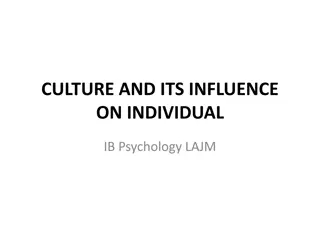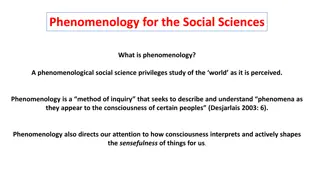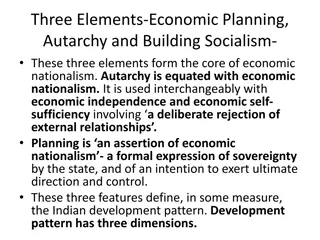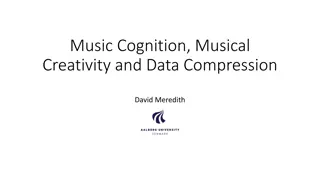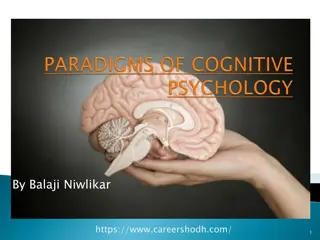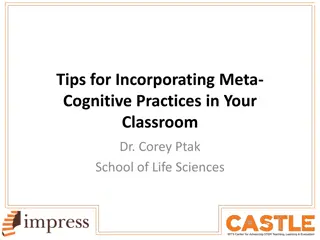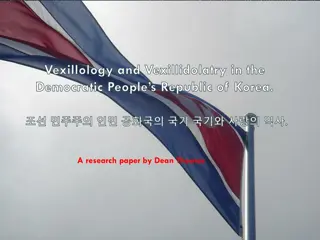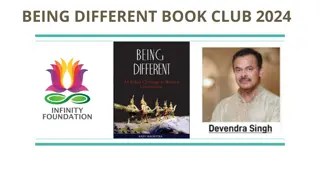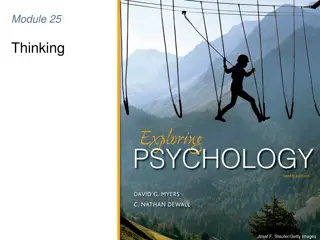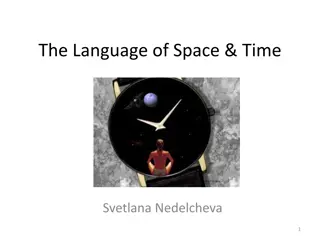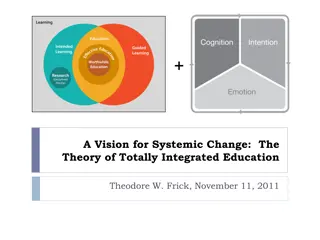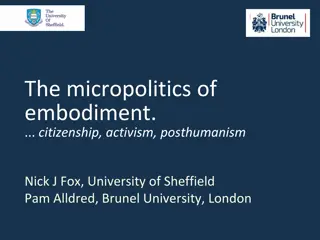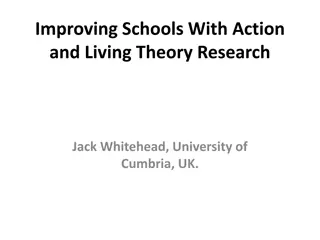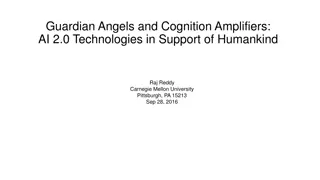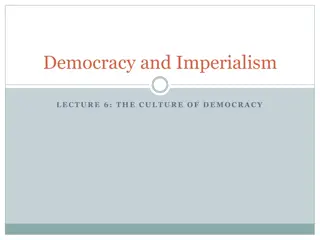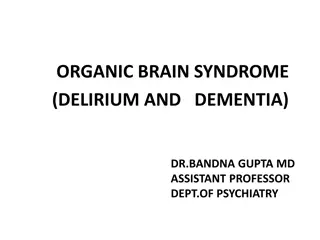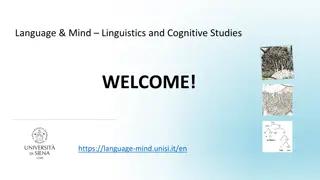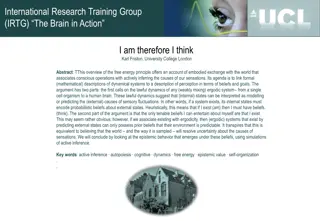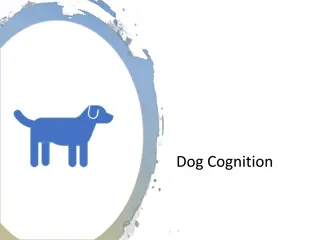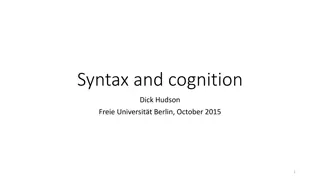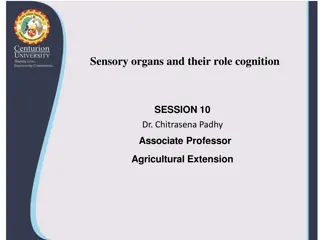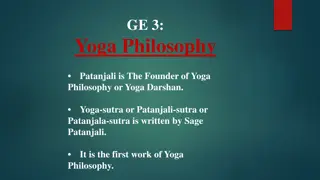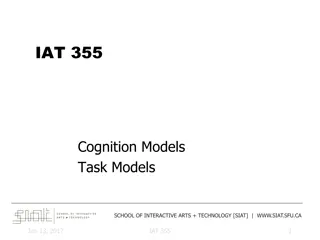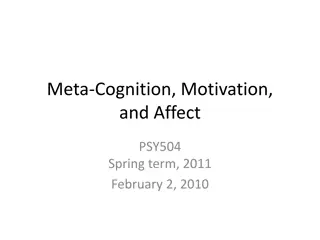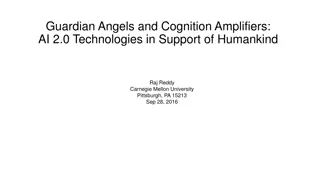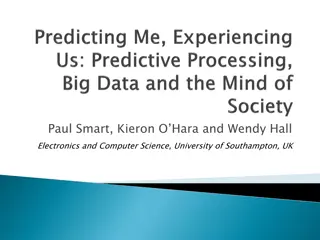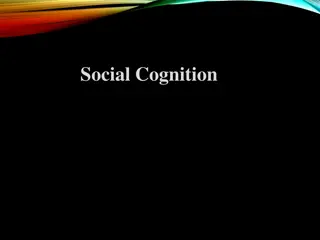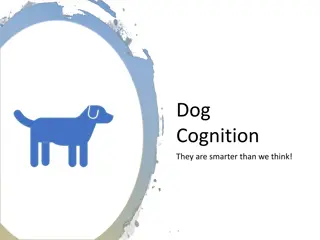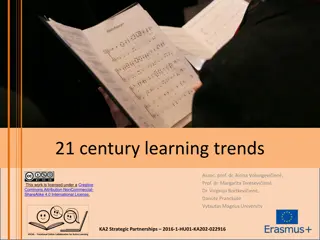MPJH Course Selection Information for Incoming 8th Graders
MPJH is providing course selection guidance for 8th-grade students, emphasizing skills and values like trustworthiness, leadership, and scholarship embodied by the E.A.G.L.E.S. acronym. Students in the top 10% of their graduating class in Texas can be considered for automatic admission to public col
2 views • 22 slides
Why Choose Candle Making For a Memorable Bachelorette Party
Opt for candle making to elevate your bachelorette party experience. Dive into a creative journey with friends, crafting personalized candles and sharing laughter-filled moments. Break away from routine celebrations, enjoy flexibility in location, and cherish the lasting memories embodied in handcra
5 views • 26 slides
Understanding the Impact of Culture on Behavior and Cognition in IB Psychology
Explore the diverse facets of culture's influence on individual behavior and cognition in IB Psychology through topics like cultural origins, norms, and Hofstede's dimensions. Dive into mind mapping, textbook comparisons, and research studies to grasp the profound effects of culture on human psychol
2 views • 41 slides
Understanding Phenomenology in Social Sciences
Phenomenology in social sciences focuses on studying the world as perceived by individuals, emphasizing the active and passive aspects of consciousness. This approach explores how consciousness shapes our perception of the world and highlights the intentional acts and embodied experiences that give
0 views • 13 slides
The Development Pattern and Rationale Behind Economic Nationalism in India
Three core elements - economic planning, autarchy, and building socialism - define India's development pattern focused on self-sufficiency and state ownership of industries. The rationale behind this approach is debated between economic theory influences and Marxist perspectives, reflecting a commit
6 views • 14 slides
The Girl Who Was Plugged In: A Feminist Perspective on Science Fiction
Embark on a journey through the thought-provoking narrative of "The Girl Who Was Plugged In" by James Tiptree Jr. (Alice Bradley Sheldon). Explore the intriguing blend of embodied and disembodied connections, as well as the themes of artificiality, idealized femininity, and societal injustices portr
0 views • 12 slides
The Relationship Between Music, Cognition, and Data Compression
Music composition involves creating novel music for specific audiences. When we listen to music, our brain processes sound data through compression, seeking patterns and relationships to understand and appreciate the music better. This cognitive process is crucial for perception, cognition, and crea
0 views • 12 slides
Exploring Paradigms of Cognitive Psychology
Cognitive psychology, a branch of psychology, delves into mental processes like thinking, perceiving, remembering, and learning. This field views individuals as information processors, with paradigms guiding research methodologies. Key approaches include Information Processing, Connectionist, Evolut
0 views • 18 slides
Enhancing Learning Through Metacognitive Practices
Explore the significance of metacognition in education, including understanding metacognitive processes, knowledge of cognition, regulation of cognition, benefits for students, importance of self-reflection, and exercises that promote metacognition such as retrospectives and exam wrappers. Discover
0 views • 13 slides
Vexillology and Vexillidolatry in the DPRK: Symbols and Symbolism
Delve into the symbolism behind the flags and emblems of the Democratic People's Republic of Korea (DPRK) as showcased through a detailed exploration of their national flag, party flag, and emblem. Understand the historical significance, political undertones, and cultural representation embodied in
0 views • 40 slides
Contrasting Dharmic and Western Traditions: A Deep Dive into Cultural Differences
The Being Different Book Club 2024 explores the fundamental disparities between Dharmic and Western traditions. It challenges the notion of Western paradigms as universal and delves into the unique approaches of Dharmic traditions. Through a series of images and descriptions, the club highlights key
0 views • 12 slides
Insights from Key Quotes in To Kill A Mockingbird Chapter 1
Scout's vivid descriptions in Chapter 1 of "To Kill A Mockingbird" provide a deep insight into the setting, characters, and themes of the novel. Through quotes about Maycomb's old-fashioned charm, Scout and Jem's relationship with Atticus, and the social dynamics of the town, readers are introduced
0 views • 10 slides
Understanding Cognition and Decision Making
Cognition encompasses mental activities like thinking, knowing, and remembering, while concepts simplify thinking by grouping similar objects. Cognitive strategies and obstacles in problem-solving, such as algorithms and confirmation bias, also play a crucial role. The "Aha!" moment reflects sudden
0 views • 15 slides
Exploring the Embodied Nature of Human Cognition
Exploring the concept of embodied cognition, this content delves into how human perception and understanding are shaped by physical experiences and interactions with the world. From spatial scenes to the containment concept, it highlights the fundamental role of the body in shaping our cognitive pro
0 views • 37 slides
The Way of Beauty: Navigating Spiritual Challenges in Modern Times
The phenomena of new religiosity and emerging spiritualities present a key challenge for evangelization, touching on the evolving dynamics within contemporary societies. Amidst this landscape, the Way of Beauty emerges as a profound pathway for individuals grappling with moral teachings and seeking
0 views • 33 slides
Enhancing Education Through Totally Integrated Approach
Theodore W. Frick's Theory of Totally Integrated Education (TIE) emphasizes aligning student cognition, intention, and emotion with authentic learning tasks to create worthwhile education. TIE focuses on systemic change in education and provides a vision for improving learning outcomes by connecting
0 views • 55 slides
Exploring Embodied Citizenship from a Materialist Perspective
This exploration delves into the concept of embodied citizenship through a materialist lens, challenging essentialist and sociological viewpoints. It discusses the ontological implications of materialism, emphasizing the contextual capacities of bodies and dissolving dualisms seen in traditional per
0 views • 22 slides
Enhancing Professional Development and Educator Recognition in Cyprus
The discourse focuses on improving professional development in Cyprus, shifting towards school-based training and recognizing the expertise of Master Educators. The discussion delves into the need for structured practices, the evolving landscape of teacher training, and the challenges faced by auton
0 views • 12 slides
Guardian Angels and Cognition Amplifiers: Enhancing Human Intelligence with AI 2.0 Technologies
Harnessing the power of AI 2.0 technologies, Guardian Angels and Cognition Amplifiers (Gats and Cogs) augment human intelligence by continuously monitoring user activity patterns and intentions through smartphone sensors. These tools enable automation of daily activities, personalized assistance, an
0 views • 27 slides
The Phenomenology of Temperature Awareness in Distance Running
Researchers at the University of Gloucestershire explore the embodied consciousness of distance runners, focusing on thermoception and temperature regulation. Utilizing sociological phenomenology and phenomenological ethnography, the study delves into the sensory experiences of runners, emphasizing
0 views • 29 slides
The Culture of Democracy in Classical Athens
Explore how democracy shaped fifth-century Athenian culture, from the rise of Classical Athens and the formation of the Delian League to the perspectives of Corinthians and Pericles. Delve into the characteristics of Athenian democracy, its innovative nature, and principles of unity, equality, merit
0 views • 36 slides
Exploring Carnival and Lent in Twelfth Night
Delve into the world of Carnival and Lent as depicted in Twelfth Night, with a focus on the merrymaking, traditions, and societal views surrounding these events. Discover the contrast between festive celebrations and Puritan attitudes towards such revelries, reflecting on the themes of disruption, p
0 views • 33 slides
Neuromorphic Computing: Bridging the Gap Between Silicon and Human Cognition
This research delves into neuromorphic computing, a cutting-edge field that merges principles from biology and silicon technology to advance cognitive processing. The study explores top-down approaches, drawing inspiration from the auditory cortex for DNS, and bottom-up strategies to enhance CPU arc
0 views • 17 slides
Exploring American Romanticism: The Spirit of Nature and Imagination
American Romanticism from 1800-1860 was a movement that valued intuition and feeling over reason, embracing inner experiences and the power of imagination. It sought to escape the corrupting influence of civilization, embracing unspoiled nature and youthful innocence. The era championed individual f
1 views • 10 slides
Understanding Organic Brain Syndrome & Delirium
Overview of organic brain syndrome and delirium, including definitions, clinical features, and management. Delirium, a common psychiatric syndrome, affects consciousness, cognition, and perception, leading to increased morbidity and mortality. Recognize core symptoms, such as disturbances in conscio
0 views • 37 slides
Master in Language and Mind: Interdisciplinary MA Program at University of Siena
The Master in Language and Mind is an interdisciplinary program focusing on language as a human cognitive capacity, offering two curricula in Linguistics and Cognition and Philosophy and Cognition, with opportunities for double degree programs and collaborations with international universities.
0 views • 21 slides
The Free Energy Principle and Active Inference in Cognitive Dynamics
This overview of the free energy principle by Karl Friston delves into how conscious operations are linked to inferring causes of sensations, emphasizing the necessity of probabilistic beliefs about external states. The discussion includes topics like embodied exchange with the world, ergodic system
0 views • 32 slides
Dog Cognition: Understanding the Advanced Cognitive Abilities of Dogs
Exploring the fascinating realm of dog cognition reveals how dogs exhibit advanced cognitive abilities beyond that of many non-human primates. From social learning to strong discrimination learning, contingency reversal, and object manipulation, dogs showcase remarkable intelligence that continues t
0 views • 35 slides
Evolution of Syntactic Theory: From Psychology to Cognition
Syntactic theory has evolved significantly, influenced by psychology and cognition. The debate between phrase structure and dependency structure continues, with a shift towards integrating cognitive principles. Cognitive linguistics, including Cognitive Grammar and Construction Grammar, play a key r
0 views • 31 slides
Understanding Cultural Capital in Early Years Education
Cultural capital in early childhood education refers to the values, beliefs, and knowledge acquired through social class and cultural groups. Explored through the EYFS framework, it shapes children's educational experiences and outcomes. French sociologist Pierre Bourdieu emphasized its societal pow
0 views • 23 slides
Understanding the Role of Sensory Organs in Cognition
Leonardo da Vinci emphasized the significance of the five senses in experiencing life fully. Our sensory organs - sight, smell, hearing, touch, and taste - play vital roles in transmitting information to the brain for interpretation. Each sense has distinct functions essential for perceiving and und
0 views • 9 slides
Understanding Yoga Philosophy: Insights from Patanjali's Yoga Sutra
Yoga philosophy, founded by Sage Patanjali, explores the union of mind and body through practices like Viveka and Cittavritti. The Yoga Sutra delves into stopping mental modifications and identifies five types of Cittavrittis. These include Pramana (valid knowledge), Viparyaya (false cognition), Vik
0 views • 26 slides
Cognition Models in InfoVis: Understanding Knowledge Creation Process
Visualization plays a key role in aiding cognition by supporting knowledge creation and seeking tasks through process models and task taxonomies. Understanding the cognitive aspects of information visualization is crucial for aiding comprehension and knowledge understanding, as demonstrated by the u
0 views • 41 slides
Early Learning Guidelines for Language, Literacy, and Cognition
Explore the developmental milestones in language, literacy, and cognition for children ages 0 to 5 through various standards and guidelines, including WA Early Learning Guidelines, Teaching Strategies Gold, Common Core State Standards, and more. Encourage play, storytelling, writing, and communicati
0 views • 6 slides
Enhancing Understanding of Meta-Cognition, Motivation, and Affect in Psychology Classes
The content discusses survey responses and feedback on a psychology class focused on meta-cognition, motivation, and affect. Students shared insights on the best and worst parts of the discussions, highlighting the importance of staying on topic. The format of lectures followed by discussions was al
0 views • 53 slides
Guardian Angels and Cognition Amplifiers: Transforming Human Intelligence with AI 2.0 Technologies
This explores the integration of AI technologies to enhance human cognition through the creation of personalized Guardian Angels (Gats) and Cognition Amplifiers (Cogs). These tools leverage multimodal sensors on smartphones to monitor activities, infer intentions, and automate daily tasks. The syste
0 views • 27 slides
Understanding the Brain's Predictive Processing and Cognitive Architecture
Exploring the fascinating realm of brain function and cognition, this content delves into topics like deep learning systems, big data implications, the predictive nature of the brain, cortical hierarchy, active inference, generative models, and cognitive architectures explaining various mental condi
0 views • 21 slides
Understanding Social Cognition and Schemas
Social cognition explores how people perceive and interpret social information, using automatic and controlled thinking processes. Schemas are mental structures that help us organize knowledge about the social world, affecting how we remember, interpret, and act upon information. The self-confirming
0 views • 23 slides
Unveiling the Intelligence of Dogs: A Closer Look at Dog Cognition
Dogs possess remarkable cognitive abilities that surpass common beliefs. With a strong capacity for social and nonsocial learning, discrimination, contingency reversal, object permanence, categorization, and inferential learning, dogs exhibit behaviors indicative of advanced cognitive-emotional capa
0 views • 35 slides
Emerging Trends in 21st Century Learning Pedagogies
Higher education faces the challenge of adapting to a changing world at the turn of the 21st century. Innovative learning pedagogies such as distributed cognition, personalization, openness, student-generated content, and interactive learning are key in preparing institutions for future competitiven
0 views • 21 slides


